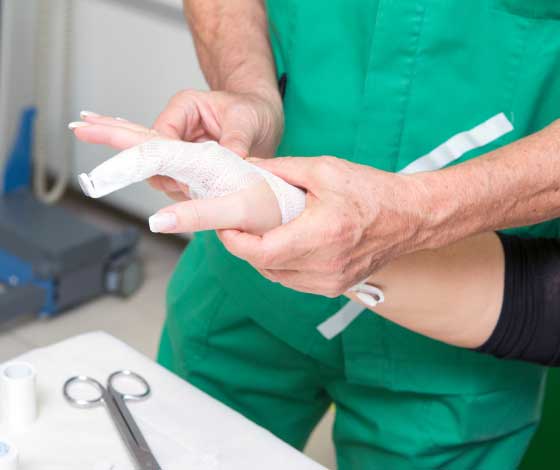Knowing the Symptoms of a Broken Finger and When to See a Doctor

Do you know the signs and symptoms of a broken finger?
You know how much this injury can hurt if you’ve ever shut your fingers in a car door or jammed your thumb during a pickup basketball game. While any damage to your fingers is painful, many injuries don’t require a trip to the doctor. So, how do you know if your finger has actually been broken (also known as being fractured)? And when is a finger injury considered an emergency?
This blog article will describe the symptoms of a fractured (broken) finger. It also covers when you should get your finger checked out by a doctor versus when you should visit the emergency room. We’ll also discuss the types of treatments that may be recommended to heal your fracture. Keep reading to learn more.
How Do I Know if I Broke My Finger?
A broken finger, also called a fracture, occurs when one or more of the bones in your finger break. Each of your fingers is made up of three tiny bones called phalanges (the thumb has two). Breaks can happen in any of these small bones or your knuckle joint.
Finger fractures can happen to anyone, at home or in the workplace, but they’re also frequently seen in teens and adults who play sports. Some of the most common causes of broken fingers include:
- Shutting Your Finger in a Door or Drawer
- Putting Out Your Hands to Brace for a Fall
- Getting Hit in the Hand by a Hard, Fast-Moving Object, Like a Baseball
- Trauma Events, Such as Car Accidents
- Injuring Your Finger While Using a Power Tool or Hammer
Broken Finger Symptoms
Broken bones may be simple, clean breaks. Other fractures can have multiple fragments (comminuted), possibly involving nearby joints or adjacent bones. Nerves and blood vessels in the finger can also be damaged, causing pain, numbness, or reduced function.
Pain is one the first and most prominent symptoms of a broken finger you’ll notice when an injury occurs. But since pain is typical with most finger injuries—even less serious ones—it’s essential to look for other signs of fracture, including:
- Problems Bending Your Finger
- Finger Deformity (Pointed the Wrong Direction)
- Numbness
- Bruising (More Common With a Break Than Other Injury Patterns)
- Redness
- Swelling
- Tenderness
You may not experience all of the above symptoms of a broken finger, even when it is actually fractured. Depending on the bone that was impacted, some people will still be able to move a broken finger. That’s why it’s critical to see a specialist to examine your injury so they can make a proper diagnosis.
Broken Finger Diagnosis
The sooner you start treatment on a hand or finger injury, the better. So if you or your child is showing symptoms of a broken finger, you should see an expert in treating injured fingers.
A hand specialist will ask about how you got hurt and any symptoms you’re experiencing. They will also examine your injured finger to look for any areas of deformity or abnormal angulation or rotation. They’ll also check to see if your finger looks shorter than it should be.
Your doctor may also order X-rays to look for fractures or joint damage in your hand and evaluate stability.
Should You Go to Urgent Care for a Broken Finger?
While hurting your finger is not typically an emergency, some injuries are severe or can become infected. If you have any of the following symptoms of a broken finger, seek medical attention right away:
- You Can See Your Finger Bone
- There Is Severe Bleeding
- Your Hand or Arm Becomes Cold, Blue, or Numb
- You Can’t Move Your Finger or Hand
- Pain, Swelling, or Redness Is Getting Worse
Treating a Broken Finger
If you or your child is diagnosed with a broken finger, your hand specialist will develop the best treatment plan based on the location and severity of the fracture as well as your treatment goals.
In many cases, a specialist will put a splint on your injured finger or tape it to the finger next to it. Both options are meant to minimize the movement of your broken finger and provide support while the fracture heals.
If your finger is considered unstable or is associated with significant deformity, a hand specialist may recommend a procedure to help realign your finger. This could entail administering local anesthesia (numbing the finger) while they align the fragments of your fracture or performing surgery to align the fragments and place wires, screws, or other devices to hold it in place as it heals.
You may need to wear a splint or tape for three to four weeks as your finger heals. Once you’re cleared to remove the splint, occupational therapy is often recommended to help you regain a normal range of motion in your fingers.
Will a Broken Finger Heal Itself?
If a broken finger is appropriately treated with conservative methods like splinting, most fractures will heal without the need for surgery. It can take a few weeks or months (even up to a year) for a finger fracture to heal, depending on its severity.
Consulting a hand specialist and following their care plan gives you the best chance at a speedy recovery.
Will I Need Surgery?
While most people with a broken finger won’t need surgery, there are some cases in which it may be required. One or more of the following can sometimes result in the need for operative treatment to heal a finger fracture:
- Injury to a Joint, Tendon, Ligament, Nerve, or Artery
- Multiple Fractures to the Area
- Loose Bone Fragments in the Finger or Hand
- Unstable Fractures That Can’t Be Supported With a Splint
- Wounds Associated With the Fracture
During surgery to repair a broken finger or related injury, a hand surgeon may use screws, plates, pins, or wires to hold the bones together.
Trust the Hand Experts at IHTSC
For over 50 years, Indiana Hand to Shoulder Center has provided complete care for hand, wrist, elbow, and shoulder injuries, disorders, and conditions.
If you have the symptoms of a broken finger, our experienced team of hand surgeons, advanced practice providers, and prominent hand therapists can help.
Call us at (317) 751-5904 to set up an appointment today.

You might also like:
Disclaimer: The materials on this website have been prepared for informational purposes only and do not constitute advice. You should not act or rely upon any medical information on this website without a physician’s advice. The information contained within this website is not intended to serve as a substitution for a thorough examination from a qualified healthcare provider. The display of this information is not intended to create a health care provider-patient relationship between the Indiana Hand to Shoulder Center and you.



